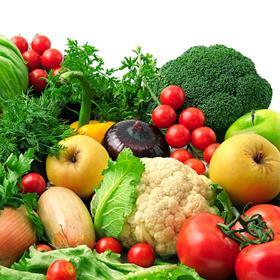
People who eat large amounts of fruit and veg in their early 20s could be a quarter less likely to have blocked or restricted arteries in their 40s.
Scientists found that people who ate a diet rich in fruit and vegetables in their early-20s had better heart health when they were tested in their 40s, than those who didn't.
Previous studies have shown the benefit of a diet rich in fruit and vegetables reducing heart disease risk among middle-age adults, but the new study is the first to examine whether eating more fruits and vegetables as young adults could produce a measurable improvement in the health of the heart and blood vessels years later.
Researchers at the Minneapolis Heart Institute in Minnesota found those who ate such a diet had less calcified coronary artery plaque two decades later which can be measured in CT scans.
Senior consulting cardiologist Dr Michael Miedema said: 'People shouldn’t assume that they can wait until they’re older to eat healthy - our study suggests that what you eat as a young adult may be as important as what you eat as an older adult.
'Our findings support public health initiatives aimed at increasing fruit and vegetable intake as part of a healthy dietary pattern.'
The study involved 2,506 participants divided into three groups, based on their daily consumption of fruits and vegetables.
Women in the top third ate an average of nearly nine servings of daily fruits and vegetables and men averaged more than seven daily servings.
A serving was counted as one item of fruit, or a cupful of berries. Potatoes were not counted as vegetables.For the purposes of the study, eating two bananas, for instance, would count as two servings.
In the bottom third, women consumed an average 3.3 daily servings and men 2.6 daily servings.All servings were based on a 2,000-calorie-a-day diet.
Those who ate the most fruit and vegetable at the study’s start had 26 per cent lower odds of developing calcified plaque 20 years later, compared to those who ate the least amount of fruits and vegetables.
Fruit and vegetables had a more protective effect on women’s health than men’s in the study, the authors found.
Researchers studied health information from adults in the Coronary Artery Risk Development in Young Adults (CARDIA) study, a government-funded study of black and white young adults, which started in 1985.
At the study’s start, participants provided a detailed diet history, information on other lifestyle variables and cardiovascular risk factors such as blood pressure, whether or not they smoked cigarettes, weight and others.
Twenty years later, participants underwent a CT scan to check for buildup of calcium on the walls of the arteries of the heart, which is calculated as a coronary artery calcium score.
Higher coronary calcium scores are associated with a higher risk for heart attacks and other coronary heart disease events.
The researchers noted: 'Our results reinforce the importance of establishing a high intake of fruit and vegetables as part of a healthy dietary pattern early in life.’
The study was published in the American Heart Association journal Circulation.



